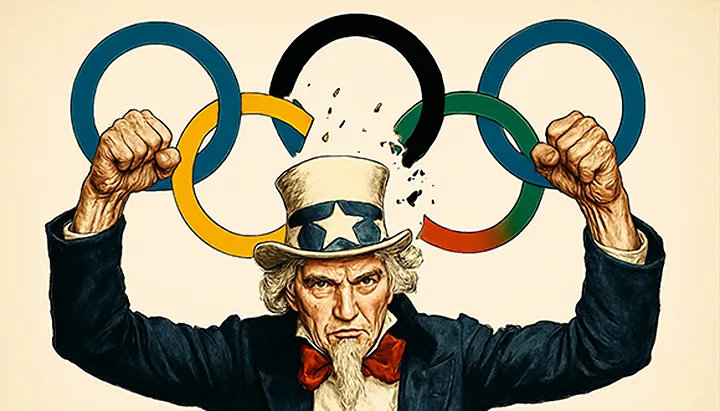Los Angeles, the mecca of film and the entertainment industry, is preparing to write a new chapter in its Olympic history by becoming, in 2028, the third city in the world—after London and Paris—to host the Summer Games for the third time.
Under the glitz of Hollywood and the power of big corporate sponsors, the Californian city promises an unprecedented media spectacle. However, behind the glitz of the Olympic rings that will soon crown the iconic sign on the hill, a disturbing question lurks: will Cuba, the small Caribbean island that has defied the longest blockade in history for decades, be able to participate in this sporting event?
The collective memory still remembers the anti-communist spectacle orchestrated on the eve of the 1984 Los Angeles Olympic Games by Reagan, the mediocre actor who became president of the United States, which culminated in the regrettable absence of the Soviet Union and several socialist nations, including Cuba.
The shadow of exclusion once again looms over Cuban athletes, who are recurring victims of a US immigration and sports policy that has escalated in recent years to levels of intolerable absurdity. The recent cases of Cuban delegations being denied visas—including the embarrassing episode of the girls’ softball team being prevented from competing in a qualifying tournament in Puerto Rico—are not mere “bureaucratic errors,” but pieces of a political framework designed to marginalize Cuba from the international stage.
The Cuban delegation that was supposed to participate in the Caribbean qualifying tournament for the Little League World Series for girls’ softball, ages 9-10, was prevented from traveling to the venue due to the denial of visas for several of its members.
The US Embassy in Havana granted visas only to the 14 players, denying that right to the seven adults responsible for conducting the competitive process and ensuring the integrity of the girls, according to the Cuban Baseball and Softball Federation (FCBS). And this has not been an isolated incident.
The hypocrisy of the United States is evident when, while sprinkling its rhetoric with the colors of “inclusion” and “universal human rights,” it engages in practices that contradict those principles and flagrantly violates the Olympic Charter, which requires host countries to guarantee the participation of all nations without discrimination. How can we trust that Los Angeles 2028 will be a celebration of unity, peace, and friendship among the peoples of the world when the US government continues to use sports as a weapon of political pressure?
The silence of the International Olympic Committee (IOC) in the face of these events completely undermines Olympic values. While acting with a heavy hand against other countries on geopolitical grounds, it looks the other way when its main sponsor, the United States, applies sports apartheid against Cuba and other countries. The question inevitably arises: Where are the Olympic principles of neutrality and fair play?
From its opulent headquarters in Lausanne Switzerland, the IOC maintains a silence that is not diplomatic, but political and deeply biased. While sanctioning Russian and Belarusian athletes with exclusion—even under a neutral flag—for the conflict in Ukraine, it has not issued a single condemnation when Washington denies visas to Cuban delegations, flagrantly violating the principle of universality enshrined in the Olympic Charter. Worse yet, it remains silent on the Israeli genocide in Gaza.
The hypocrisy reaches the extreme of allowing Israeli athletes to compete under their flag without restrictions. The underlying message is clear: the IOC does not punish war crimes, but those who are not aligned with the West. Meanwhile, it prefers to navigate the calm waters of corporate diplomacy, where million-dollar contracts with US sponsors take precedence over the rights of athletes from the global South.
If the IOC does not demand that the US respect the Olympic principles without restriction—as it does with other nations—Los Angeles 2028 will not be remembered as a Games of unity, but as the consecration of universal sport hijacked by geopolitical interests.
The anti-Cuban obsession of Marco Rubio, who whispers into the ears of the current occupant of the Oval Office, has turned sport into yet another hostage of his hostile agenda. During the Donald Trump administration, this policy became more radical, disfiguring the Olympic spirit and transforming the symbol of unity into a mechanism of exclusion.
With three years on the horizon, the world is watching. Los Angeles 2028 will not only be the greatest celebration of sport, but also a mirror of its time. The legacy and spirit of Pierre de Coubertin will be put to the test, as will the foundations of Olympic ethics, in the face of the challenges of an era marked by extreme political polarization. And Cuba, as it has had to so many times before, will have to face them with the same tenacity and fortitude with which its athletes face adversity and conquer podiums.
We can only hope that Los Angeles 2028 will not be hijacked by the spirit of “Make America Great Again,” in an emulation of the supremacist madness that marked Berlin 1936. Worse still, let us hope that anti-immigrant policies and the deep contempt they engender do not repeat the regrettable scenes of horror witnessed in Centennial Park during the 1996 Olympic Games in Atlanta.
Source: Cubadebate, translation Resumen Latinoamericano – English
Join the Struggle-La Lucha Telegram channel

